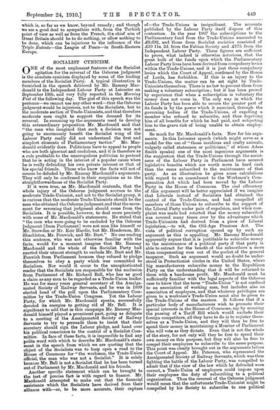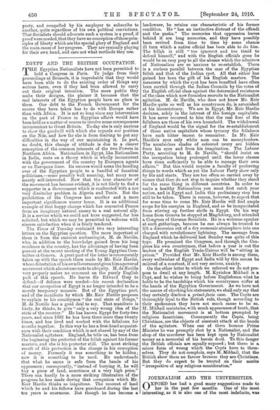SOCIALIST CYNICISM.
ONE of the most unpleasant features of the Socialist agitation for the reversal of the Osborne judgment is the absolute cynicism displayed by some of the leading members of the Socialist Party. A typical illustration is furnished in the speech delivered by Mr. Ramsay Mac- donald to the Independent Labour Party at Leicester on September 18th, and very fully reported in the Morning Post of the following day. The gist of this speech was the pretence—we cannot use any other word—that the Osborne judgment would be injurious, not to the Socialists, but to the moderate section of Trade-Unionists, and that therefore moderate men ought to support the demand for its reversal. In summing up the arguments used to develop this extraordinary proposition Mr. Macdonald said that " the man who imagined that such a decision was not going to enormously benefit the Socialist wing of the Labour Party really did not understand the first and simplest elements of Parliamentary tactics." Mr. Mac- . donald evidently does. Politicians have to appeal to people who are both ignorant and credulous, and it is therefore as a rule profitable to the unscrupulous politician to pretend that he is acting in the interest of a popular cause when he is really defending his own private interest or that of his special friends. Those who know the facts will not of course be deluded by Mr. Ramsay Macdonald's arguments. They will only be confirmed in their suspicions as to the straightforwardness of the Socialist Party. If it were true, as Mr. Macdonald contends, that the whole injury of the Osborne judgment accrues to the moderate Trade-Unionist, and not to the Socialist group, it is curious that the moderate Trade-Unionists should be the men who obtained the Osborne judgment, and that the move- ment for reversing that judgment should come from the Socialists. It is possible, however, to deal more precisely with some of Mr. Macdonald's statements. He stated that " the men who were going to be excluded by the Osborne judgment [from Parliament] were not men like himself or Mr. Snowden or Mr. Heir Hardie, but Mr. Henderson, Mr. Shackleton, Mr. Fenwick, and Mr. Burt." No one reading this sentence, who was not otherwise familiar with the facts, would for a moment imagine that Mr. Ramsay Macdonald. and the whole of the Socialist Party had exerted their utmost strength to exclude Mr. Burt and Mr. Fenwick from Parliament because they refused to pledge themselves to obey a party which was committed to Socialism. Nor would. it occur to the unsophisticated reader that the Socialists are responsible for the exclusion from Parliament of Mr. Richard Bell, who has as good a claim as any man to be regarded as a Trade-Union leader. He was for many years general secretary of the Amalga- mated Society of Railway Servants, and he was in 1899 elected. head of the poll upon the Parliamentary Com- mittee by the Trade-Union Congress. Yet the Tabour Party, for which Mr. Macdonald speaks, successfully devoted its energies to getting rid of Mr. Bell. It is significant to add that in this campaign Mr. Ramsay Mac- donald himself played a prominent part, going as delegate to a meeting of the Amalgamated Society of Railway Servants to try to persuade them to insist that their secretary should sign the Labour pledge, and hand over his political conscience to the control of a Socialist Com- mittee. In face of these facts, it is impossible to find any .polite word with which to describe Mr. Macdonald's state- ment in the speech from which we are quoting that the object of the Socialists was to keep open a road to the House of Commons for " the workman, the Trade-Union .official, the man who was not a Socialist." It is solely because Mr. Bell is not a Socialist that he has been turned out of Parliament by Mr. Macdonald. and his friends. Another specific statement which can be brought to the test of precise fact is with regard to finance. Mr. Macdonald attempted. to make out that the financial assistance which the Socialists have derived from their _alliance with—or, to be more accurate, their capture of—the Trade-Unions is insignificant. The accounts published by the Labour Party itself dispose of this contention. In the year 1907 the subscriptions to the Parliamentary fund from the Trade-Unions amounted to .28,692, and those from Socialist societies consisted of .210 lls. 2d. from the Fabian Society and £175 from the Independent Labour Party. These figures are sufficient to prove, what indeed is otherwise notorious, that the great bulk of the funds upon which the Parliamentary Labour Party lives have been derived from compulsory levies within the Trade-Unions, and it is just these compulsory levies which the Court of Appeal, confirmed by the House of Lords, has forbidden. If this is an injury to the Trade-Unions, the matter can be set right by Trade- Unionists themselves. There is no law to prevent them from making a voluntary subscription; but it has been proved by experience that when a subscription is voluntary the money does not come in. The only way in which the Labour Party has been able to secure the greater part of its funds is by the power which it exercised, through the governing bodies of the Trade-Unions, of expelling a member who refused to subscribe, and thus depriving him of all benefits for which he had paid, and subjecting him to the grave risk of being unable to obtain employ- ment.
So much for Mr. Macdonald's facts. Now for his argu- ments. In this Leicester speech (which might serve as a model for the use of "those insidious and crafty animals, vulgarly called statesmen or politicians," of whom Adam Smith speaks) one of the most ingenious arguments is the suggestion that the Trade-Unions through the assist- ance of the Labour Party in Parliament have secured legislative benefits which are worth more in hard cash than the sums subscribed to the maintenance of that party. As an illustration he gives some calculations with regard to an amendment to the Workmen's Com- pensation Act which had been moved by the Labour Party in the House of Commons. The cool effrontery of this argument will be better appreciated if we imagine that Liberals instead of Socialists had obtained the control of the Trade-Unions, and had compelled all members of those Unions to subscribe to the support of the Liberal Party under pain of expulsion, and when com- plaint was made had retorted that the money subscribed was covered many times over by the advantages which Trade-Unionists had derived from a piece of Liberal legislation,—to wit, the Old-Age Pensions Act. The vista of political corruption opened up by such an argument as this is appalling. Mr. Ramsay Macdonald apparently argues that it is justifiable to subscribe money to the maintenance of a, political party if that party is able to extract for the benefit of the subscribers a more than compensating sum out of the pocket of the general taxpayer. Such an argument would no doubt be under- stood in Protectionist circles in the United States, where big manufacturers subscribe money to the Republican Party on the understanding that it will be returned to them with a handsome profit. Mr. Macdonald must be sufficiently familiar with the legal aspects of the Osborne case to know that the term " Trade-Union " is not confined to an association of working men, but includes also an association of employers, and that whatever privileges are given to a workmen's Trade-Union must also be given to the Trade-Unions of the masters. It follows that if a particular body of manufacturers wish to promote their special interests in the House of Commons, say by securing the passing of a Tariff Bill which would exclude their foreign competitors, all they have to do is to register them- selves as a Trade-Union, and they will then be free to spend their money in maintaining a Member of Parliament who will vote as they dictate. Even that is not the whole of the story, for not only will they be free to spend their own money on this purpose, but they will also be free to compel their employees to subscribe to the same purpose. This point was clearly brought out in the arguments before the Court of Appeal. Mr. Peterson, who represented the Amalgamated Society of Railway Servants, which was then fighting the battle of the Labour Party, was compelled to admit that if the view of the law which he defended. were correct, a Trade-Union of employers could impose upon their employees the duty of subscribing to a political organisation. Thus the reversal of the Osborne judgment would mean that the unfortunate Trade-Unionist might be compelled. by his Society to subscribe to one political party, and compelled by his employer to subscribe to another, quite regardless of his own political convictions. That Socialists should advocate such a system is a proof, if proof were needed, that they have no conception of those prin- ciples of liberty which are the special glory of England and the main cause of her progress. They are cynically playing for their own hand, and care not what methods they use.











































 Previous page
Previous page